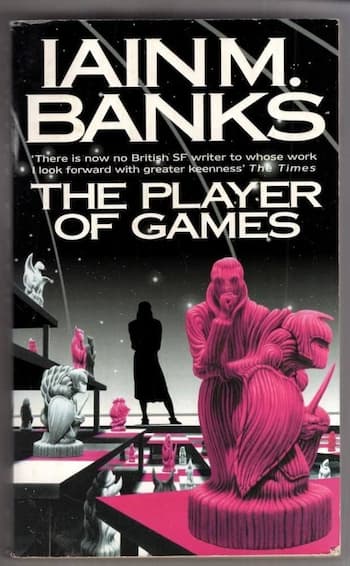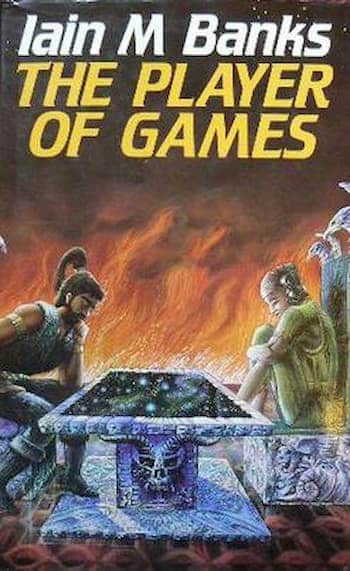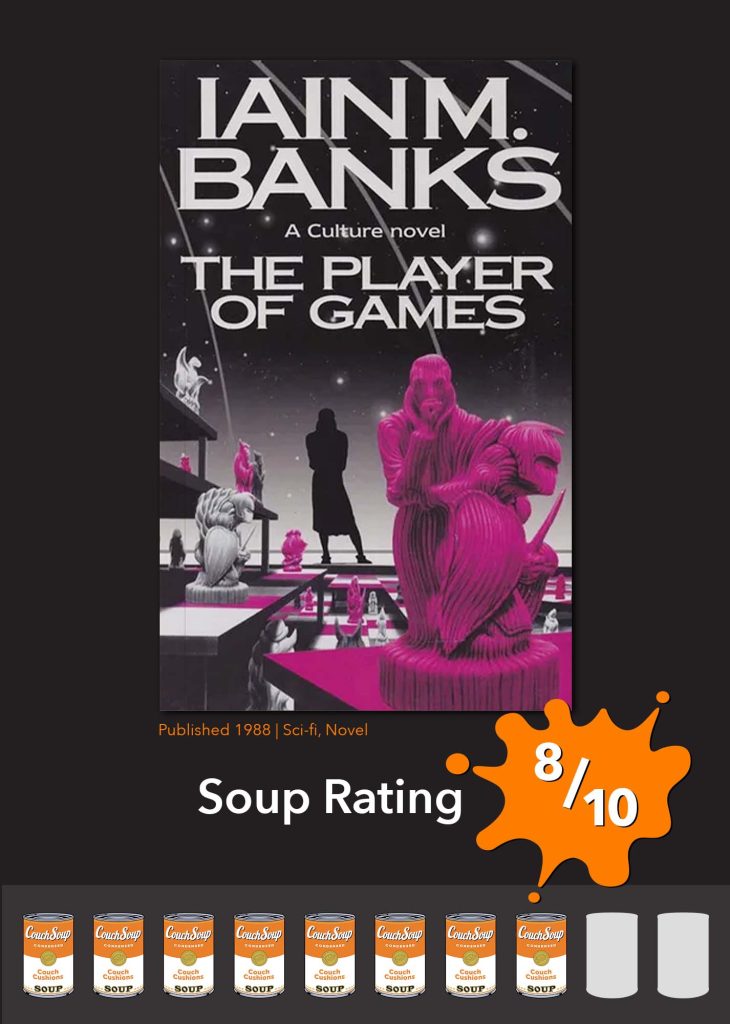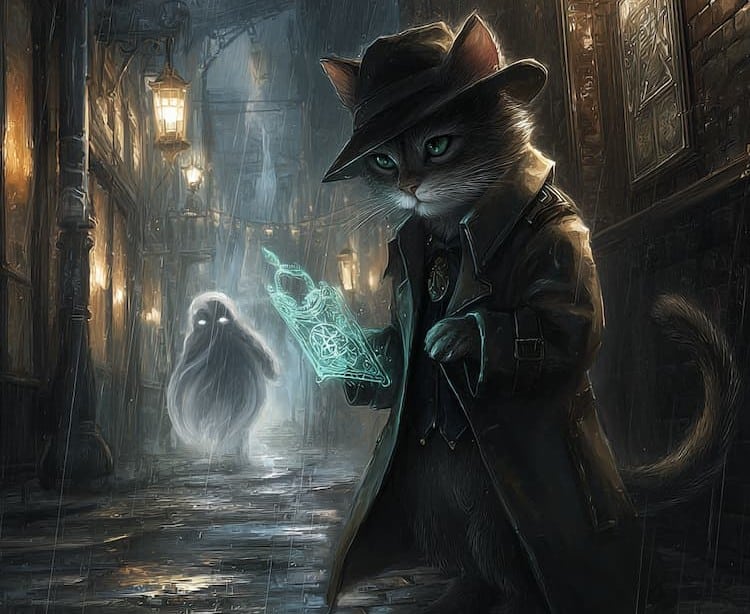- Home
-
Games
-
Movies & TV
-
Videos
- Comics & Books
- Podcasts
- Store
- Who We Are
- ---
- Login
- Account
- Our Circle
- Contact Us
- ---
- WANT TO CONTRIBUTE?
- Privacy Policy
- Terms of Service

Welcome to a day in the life of a Culture citizen. Jernau Morat Gurgeh (pronounced variously in the book) is a professional game player. His eccentricities are that he doesn’t travel and hasn’t changed from his gender assigned at birth, even though it is generally expected to do so. This is how you know we have entered the post-scarcity life of The Culture. That and having a job which is apparently deeply enjoyable.
Player of Games (Banks, 1988) is the second of Iain M. Banks’ Culture novels and the first to solidify the themes of what the series will become. The plot is much more direct compared to the cross-galactic romp of Consider Phlebas. Gurgeh (a chosen name, meaning Player of Games) is experiencing ennui. His life on his wonderful orbital, with correspondence with other game aficionados, no longer sparks joy.
Spoilers begin here.
The Call to Action Comes for us All

He has a crush, although she’s way too cool for him, and he has the delightfully idiosyncratic friend Mawhrin-Skel, a small drone who washed out of Special Circumstances for being too much of an abrasive jerk.
This introduction of Contact and its sub-branch Special Circumstances (SC) as just about the only thing resembling organization within The Culture is much more formal here than in Consider Phelbas. Special Circumstances have a reputation for going to interesting places, meeting interesting aliens, and overthrowing their governments. However, this is all far too interesting for Gurgeh, who declines the call. In a game that he has just the possibility of not winning perfectly, Mawhrin-Skel offers to cheat in exchange for being allowed back into SC. Gurgeh, in a fit of doubt, accepts.
Thus begins the main plot. Gurgeh, blackmailed, accepts an offer from Contact to play a game in the Empire of Azad. The game is called Azad, and it is everything. Apparently, this game, which sounds like a combination of Poker, Magic: The Gathering, Cataan, Bridge, Chess, and Cosmic Encounters, defines the entire culture of the Azadian Empire. They use it as a placement exam, although only the (explicitly third, explicitly superior) Apex gender is truly allowed to play; obviously, males and females cannot truly excel and aspire to leadership.
Gurgeh begins practicing on the yearlong journey over but hides his skill even from the ship and the chaperone/protocol drone Flere-Imshaho accompanying him. When he lands, he finds himself not only welcomed into the barbaric, sexist, fascist Azadian Empire but also confronted with Kompromat traps, bets on castration for the loser, and the sheer degradation of a society that appears to be genetically engineering sexual trimorphism into their species to maintain control. Oh, and assassination attempts.
But if your power can be taken away, it was never yours to begin with. Early on, Gurgeh is knocked out but gets back in on the wildcard and proceeds to mop the floor with every opponent. Upon his accession to the finals of the game, on a gorgeously set planet named Echronedal, Gurgeh is informed that a recording of his loss is already recorded. Please take an interview detailing his loss here, and everything will be fine. Against his Ship and Chaperone’s better judgment, he does so, staying in the game despite a public, false defeat.
Breaking out of the rules into being the player
Before the final contest, Flere-Imshaho plays his own language, Marain. We casually explore linguistic relativity for Gurgeh’s actions and how he can move forward. He is living the game of Azad as an Azadian, but he’s playing against the Emperor for the throne, a highly skilled opponent. Flere-Imshaho then plays him Azadian TV. Not just the ultraviolence and sex for the plebes, but the snuff films and worse, only available to the upper crust of society. Gurgeh doesn’t speak; merely goes to war. Note this section is a whole content warning for itself. It’s rough.
In the Championship round, on the backdrop of the so-called Fire Planet, with a 7-year cyclic firestorm nearly ready to rage across the planet destroying everything, Gurgeh plays like The Culture. He retreats, he confronts, and he shepherds resources. He absolutely, brutally demolishes the Emperor. The Emperor is a sore loser, blows up the castle, abandoning himself and the highest-ranking members of the Empire to be devoured by a firestorm, and it is revealed that not only did the Empire shortly thereafter collapse, but that Flere-Imshaho was in fact Mawhrin-Skel, who chose to change his personality to join SC.
What makes it good?
A thrilling tale, told across stunning vistas, with a driving plot. This is a noble entry into The Culture, but why?
First, the intrigue. Mawhrin-Skel and Flere-Imshaho are fascinatingly and singularly annoying. They act as a foil to Gurgeh, an anchor to the foreign at first, then an anchor back to his roots. But on the ship, Gurgeh has to ask – Contact has known about Azad for 70 years, and he’s only 50. Did they breed him for this role? And the fact that he goes against instructions to win when the ship and Flere-Imshaho wanted him to bow out, were they using reverse psychology?

Intrigue is the byword for Contact and especially Special Circumstances and this plot skips past telling into showing that they are exactly as deeply complicated as they are reputed to be. But with that level of complex planning, with unreliable agents, is that even a plan? We are left uneasy with the casual omnipotence of the Minds in charge.
Spoilers end here.
Aging gracefully or indulgently?
The element of sex in the Azadian Empire, compared to The Culture, is one of the most important parts of this book. Gurgeh’s personal sexual conservatism is an eccentric weakness, but the depiction of biological sex in the Azadian Empire is a brutal extension of patriarchy. Casually self-genociding into a post-racial society, they brutally cull the “inferior” sexes from public power “for their own good.” The arguments are not out of place in modern discourse.
A modern criticism of the book would be remiss to ignore that Gurgeh is a straight, cisgender male, by choice, in a society that is anything but. As a product of the Reagan/Thatcher/AIDs era, this is revolutionary, although it is less interesting than more modern works that more deeply explore gender norms. Readers looking to explore this space should check out Becky Chambers, Tamsyn Muir, or Yoon Ha Lee.
We start with the protagonist as a character who knows they are a stick in the mud. We watch as they grow and become inoculated to the depravity of a capitalist, sexist, warlike society and what it takes to bring him back to peace. We follow as Gurgeh goes on a transformation for himself, and this arc approaches an element of spiritual synchronicity to the story. Despite his ennui being his defining character flaw, he is empowered and emboldened to be of maximum use to his people in a way that redefines him.
And what more love can a society offer you than to use your abilities to an astounding apex?
The shift into The Culture by the protagonists is a significant upgrade to Consider Phlebas. The elements that really make Player of Games a top-tier Culture novel, blowing its predecessor out of the water, are the scene-setting and pacing.
The entire third act is cerebral and complex and tense all at once, with nature being a constant threat. Having a few tighter locales serves to showcase them better and show off Banks’ world-building chops. Not all the settings are winners, but the first and third acts are gorgeously rendered.
The pacing is a mixed bag, with a long buildup and a resolution that could have arrived a little more gracefully. We can’t rate on potential, but we can see a massive improvement from Consider Phlebas that leaves one wanting to read the whole series to see how the craft can be honed to its peak.
Player of Games is an 8/10 book for me on this reread, setting the stage for greater Culture novels to come and a romp, but not without a few flaws.




